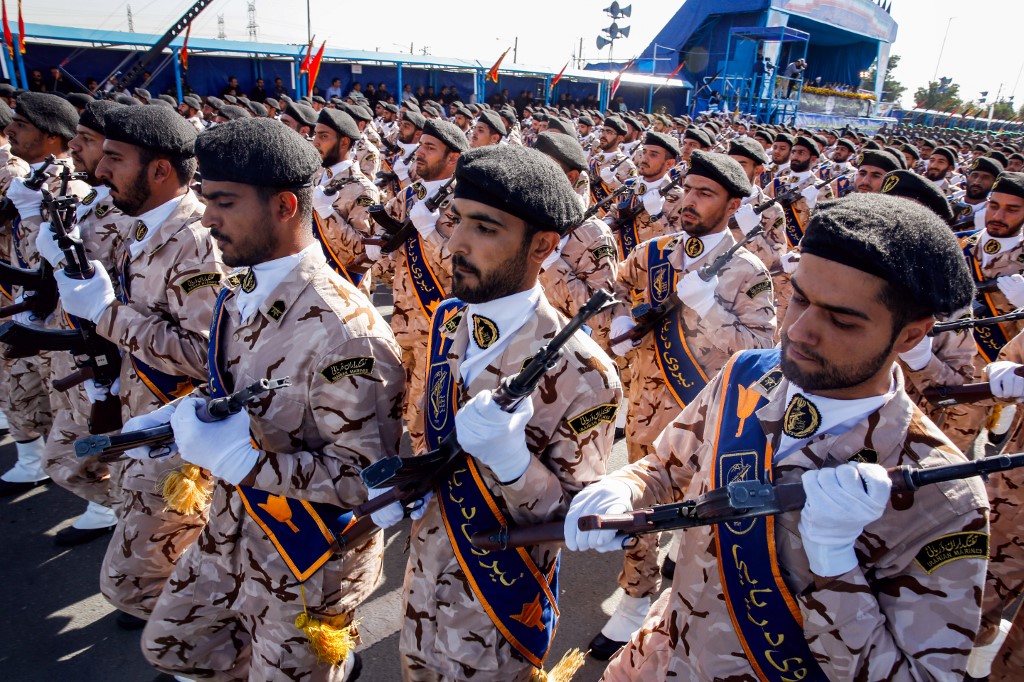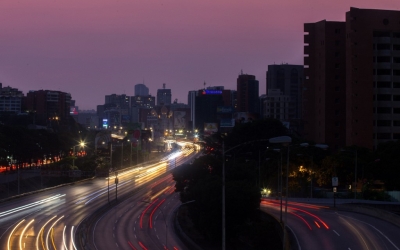US terror sanctions: Do social media companies have to comply?
US-based websites have no obligation to delete profiles affiliated with blacklisted groups, legal experts say

A spokesperson for Instagram told MEE that the company operates "under the constraints of US sanctions laws" (AFP/File photo)
Published date: 26 April 2019 1
When the United States adds a group to its terrorism blacklist, it expects social media platforms to take note and delete profiles affiliated with the sanctioned groups.
With Iran's Islamic Revolutionary Guard Corps (IRGC) recently designated as a terror group, and US President Donald Trump pushing to add the Muslim Brotherhood to that same list, scores of profiles across Twitter, Instagram, Facebook and other websites may be affected.
But free speech and legal experts say Washington may be overreaching by putting pressure on social media companies to comply with government sanctions.
A senior lawyer working on free expression issues told Middle East Eye that the US State Department has no authority to require social media platforms to censor their content.
"The platforms themselves have the right to post material and take it down as they see fit, [but] that's not something the government can require them to do," the lawyer, who requested anonymity in order to speak freely on the topic, said in a telephone interview.
Still, that hasn't stopped the US government from urging social media companies to comply with the country's terrorism blacklist.
And as those US-based companies deal with government pressure to crack down on some of their users, many appear to find it easier to cooperate with Washington, regardless of whether the US government has a solid legal justification to demand blacklisted individuals and entities have their accounts disabled.
Under the US's Foreign Terrorist List (FTO) designation, the government prohibits individuals under US jurisdiction, as well as companies, from providing "material support" to groups on the list.
Among other things, that means providing property - tangible or intangible - or services to a blacklisted group is banned.
But the government treats traditional media such as newspapers differently than user-generated platforms, resulting in especially unclear rules to the relatively new world of social media.
In particular, determining whether giving access to a member or supporter of a US-designated terrorist group to a social media platform could be considered "material support" has not yet been outlined in US legislation or solid legal precedence.
Murky waters
Jason Blazakis, former director of the State Department's Counterterrorism Finance and Designations Office, told MEE that social media platforms are required to take down profiles belonging to blacklisted individuals and entities.
"Entities, whether it's a bank or it's Twitter, really have the obligation to be proactive in removing that kind of content as soon as that designation is made," said Blazakis, who is now the director of the Center on Terrorism, Extremism, and Counterterrorism at Middlebury College Institute.
"Now if it looks like Twitter, Facebook, Instagram - you name the social media outlet - is not taking down the content, then it becomes a question of whether or not the US government is paying attention."
'If it looks like Twitter, Facebook, Instagram ... is not taking down the content, then it becomes a question of whether or not the US government is paying attention'- Jason Blazakis, former US State Department official
But the senior attorney who spoke with MEE said only US courts can issue orders for social media companies to take down content, though he said they would be unlikely to do so because of First Amendment implications.
"They can't essentially order them to take things down unless it's pursuant to a judicial order … then the platforms would have to comply with that order or contest it," he explained.
Nadine Strossen, former president of the American Civil Liberties Union (ACLU), also told MEE that the US government would be hard-pressed to get courts to find that the intangible space of media platforms amounts to "material support".
"That would be such an extremely overbroad interpretation that it would really stop different forms of freedom of speech," said Strossen, who is currently the John Marshall Harlan II Professor of Law at New York Law School.
Still, Blazakis pointed to an executive order signed by former US President George W. Bush days after the 9/11 attacks as the basis upon which the State Department has justified past attempts to get US-based social media platforms to remove content.

Still on the books, that executive order bans US entities from interacting with people or groups that commit, threaten to commit, or support terrorism.
It also bans people or entities under US jurisdiction from assisting, sponsoring, or providing material or technological support to groups or people on the government's terror designation lists.
Strossen said that like the FTO's "material support" clause, the executive order also would not likely hold up if challenged in court.
"That executive order would be found to be unconstitutional and therefore the government cannot coerce social media companies to take down those expressions," Strossen said.
But Blazakis said that during his time at the State Department from 2008 to 2018, officials in the terrorism designations office contacted social media companies such as Twitter to tell them they had "an obligation" to make sure they were not providing a platform for a blacklisted group to "raise money or put out its propaganda".
"If they are requesting, rather than ordering, then that is one thing," Strossen said.
But if the government has told platforms they are "obligated" to take down content, she said, "that would definitely be an abridgment of [free] speech".
'Sorry, this page isn't available'
In mid-April, Washington labelled Iran's Revolutionary Guard Corps (IRGC), the country's elite military force, a terrorist organisation.
The designation, under the US's FTO mechanism, is the first time an agency of a foreign government has ever been blacklisted.
Shortly after the decision was taken on 15 April, an unverified Instagram page seemingly belonging to Ezzatollah Zarghami, a 2021 Iranian presidential candidate and former senior military general in the IRGC, was temporarily blocked.
Scores of other Iranian officials also had their profiles blocked, some permanently.
"We operate under the constraints of US sanctions laws," said a spokesperson for Instagram, which is one of the only US-based social media companies that Iranians can freely access from inside the country.
'We work with appropriate government authorities to ensure we meet our legal obligations, including those relating to the recent designation of the IRGC'- Spokesperson for Instagram
"We work with appropriate government authorities to ensure we meet our legal obligations, including those relating to the recent designation of the IRGC," the spokesperson told MEE in an email, without going into detail about specific accounts.
But what it means to be affiliated with the IRGC is not always clear - and that makes it more difficult for social media companies to decide what accounts to take down if they need to comply with US regulations.
US-based social media companies also appear to be setting their own policies when it comes to how, and whether, they respond to the US's terrorism blacklist.
YouTube, which is owned by Google, took down a channel belonging to Iran's state-run news agency, PressTV, after the US put the IRGC on its terrorism blacklist.
PressTV ultimately answers to Ayatollah Ali Khamenei, who also leads the Islamic Republic of Iranian Broadcasting (IRIB), the state-run broadcaster that is also sanctioned by the US government.
PressTV's YouTube channel resurfaced and became accessible again after a few days, but for two weeks the company was unable to upload new content to its page. The news agency's Gmail accounts, also owned by Google, were shut down as well, PressTV said in a statement on 19 April. It is unclear if they remain down.
Despite the trouble with Google, Press TV's Twitter and Instagram pages were unaffected.
Loopholes and anonymity
The answer to why platforms treat content that could violate US sanctions regulations differently appears to lie in the companies' terms of services.
At the very top of Google's "Featured Policy" on "Violent Extremism", the American tech-giant clearly states that content violates its terms of use if it "includes material produced by government-listed foreign terrorist organizations".
Instagram also states that it abides by US government sanctions lists.
But Twitter makes no mention of sanctions or government blacklists in its general guidelines and policies on "violent extremists groups". A spokesperson for the US-based company declined to answer MEE's question about whether US sanctions were part of its policy.
Under the list of the reasons Twitter may take down a profile, the company says exceptions can be made for "groups with representatives elected to public office through democratic elections".
Twitter also says it makes exceptions for "military or government entities" under its policy for violent extremist groups.
The IRGC, for instance, is both a military and a government entity.
Hamas and Hezbollah, two other groups on the US blacklist, could arguably fall under that dual category as well, since they both have an armed wing and also participate in elections in the Palestinian territories and Lebanon, respectively.
The Hamas movement has several active unverified Twitter profiles, some of which are nearly 10 years old, that have amassed hundreds of thousands of followers and are updated with press releases and statements daily.
Enforcement
But even if the US government believes social media companies that fall under its legal jurisdiction have violated the provisions of the terrorism blacklist, whether Washington can take punitive action remains unknown.
A US Department of Justice spokesperson refused to say whether it is illegal for a US-based social media website to host accounts affiliated with blacklisted groups.
"We evaluate each situation based on the individual facts and make determinations based on where the evidence takes us," the spokesperson said in an email.
The spokesperson also did not provide information on what consequences websites could face should they allow blacklisted groups or individuals to maintain profiles on their platforms.
Blazakis, the former State Department official, said he did not know what would happen if a social media platform decided to keep contentious content online, in defiance of US government rules.
"It would be an interesting test case if you had a company take a stand like that," he said. "Whether or not it would actually result in prosecution, and whether the US government has an interest in prosecuting, I think is an open question."
'The platforms themselves have the right to post material and take it down as they see fit, [but] that's not something the government can require them to do'- Senior lawyer working on free speech in US
US citizens or anyone subjected to American jurisdiction may face 20 years in prison for violating the provisions of the foreign terrorist designation. For their part, foreign nationals can be denied entry into the US or have their visas revoked, among other sanctions.
A financial institution that knowingly accepts money from a blacklisted person or group may be fined up to $50,000 per violation.
But it is unclear what consequences would befall a US-based social media company for providing a platform to a blacklisted person or entity.
In those cases, Strossen said it seems like the government is more concerned with the spread of ideology than the prospect of social media companies profiting off the profiles.
"And that's where we run into abridgment and problems because ideas - even advocating violence - is constitutionally protected," she said, highlighting the difference between voicing support and actually calling for specific acts of violence.
"You are allowed to advocate terrorism. You just may not actually engage in it or intentionally incite it or conspire to engage in it, and that's a very important line."



0 Comments:
Post a Comment
Subscribe to Post Comments [Atom]
<< Home